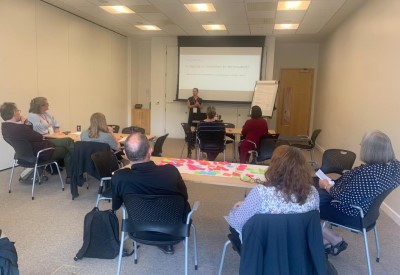"Over my head? The patient and public perspective of UK SPINE conference 2022

As a Patient and Public Involvement representative I attended the conference with a little trepidation – would I find that the science would be ‘over my head’? The answer was a pleasing ‘no’. There were times when there was a lot of scientific detail but it always sat in the wider context, which was set out so well by so many contributors, giving clarity to the principle of extending healthspan over lifespan. They also had the end user very much in sight which gave purpose and meaning to the inclusion of those of us who are not part of the geroscience community.
In Andrew Steele there was an excellent after dinner speaker who echoed other contributors. He wanted his audience to stretch their beliefs to what might be possible through geroscience. Not living for ever but living a longer, healthier, older age then we do now. Gets my vote!
He described how most people in their 60s have two or more long term conditions; multimorbidity, one of the biggest issues for the NHS and often a priority for health scientists. I am one of those people.
This was my first UK SPINE conference and I learned from a number of contributors and attendees that they live by their principles keeping up regular exercise and trips to the gym for maintaining muscle health and strength. One big takeaway was that muscle wastage is a significant issue: this conference was a real education.
Gil Jesus’ opening was inspirational and I now have a much better understanding of senescence. As the ageing population increases we’re yet to see any improvement in healthspan and there’s a need to close the gap. There are mental health issues as well, as all these health deteriorations are hard to live with emotionally as well as physically.
Janet Lord led an enthusiastic panel discussion with patient participants and spokespeople from three charities centring on conditions very common in the elderly: arthritis, stroke and macular disorders. Their discussion about the importance of involving patients and public was wide-ranging and the case imperative.
The programme also showcased some of the research funded through the UK SPINE. One takeaway, amongst many, was about rapamycin, known for its effect on the immune system but also lots of evidence for its beneficial affect on ageing. With multimorbidity also comes polypharmacy, and the many interactions drugs have with each other prompting me to think more about my prescription for statins. It’s always risk versus benefit of course.
Harriet Teare led a great workshop on Ageing Research in Society. There was a lively discussion about living with older age and comments such as, ‘being pain-free’, ‘socially healthy – has friends and not lonely’, and ‘has senses intact, sight and hearing’. Everyone has lived experience of course and everyone has an opinion about growing older.
Tina Woods was an engaging keynote speaker. ‘We live a fifth of our lives in poor health’ she said. As before I felt I was almost being addressed directly; about how much multimorbidity is preventable and there’s not a single drug that will fix the reality that 25 per cent of these conditions is genetic and 75 per cent lifestyle.
She said that being able to access our own health data should be as easy as accessing our bank record. I’m battling to access my own records right now. When scientists ask, as I heard a lot over the two days, why people don’t take the steps needed to avoid preventable disease one answer is that the NHS currently doesn’t make it easy for you to take ownership of your own data which is such a strong motivator in making changes.
As a lay person listening to specialists in the world of anti-ageing research, seeing them come together to share knowledge and expertise, was a privilege and a pleasure. Sharing their knowledge with me has been brilliant as I’m now embarking on some long overdue lifestyle changes and that’s with thanks to UK SPINE for giving me the push.
Marianne West